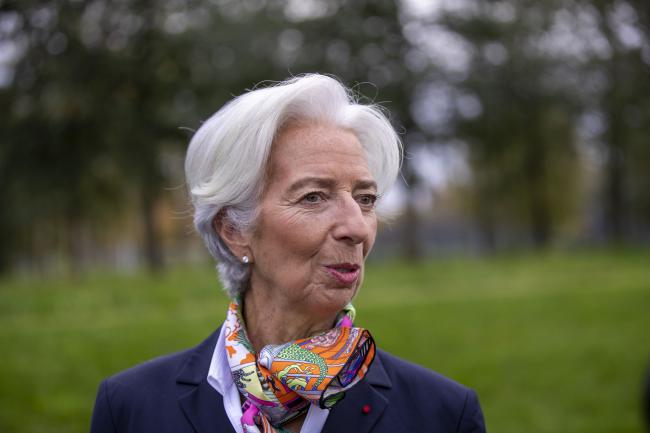(Bloomberg) -- Explore what’s moving the global economy in the new season of the Stephanomics podcast. Subscribe via Pocket Cast or iTunes.
Christine Lagarde steered clear of monetary policy in her first speech as European Central Bank president, calling instead for “strength, resolve and courage” in the region at an award ceremony for former German Finance Minister Wolfgang Schaeuble.
“I believe this is a message all of Europe needs to hear today,” Lagarde said in Berlin late Monday. “A call to remember our better selves and not to allow self-doubt to drag us down.”
On her first working day at the central bank, the Frenchwoman stayed away from discussing monetary stimulus -- typically controversial in Germany -- and said anyone who wanted to hear her views on the topic should “please leave the room.” Still, she joins the institution at a key moment, with the euro-zone economy again under stress and the ECB putting increasing pressure on politicians to step up with fiscal measures and structural reforms.
Germany, the region’s largest economy, has faced criticism for continuing to run a budget surplus, watering down proposals such as a euro-area fiscal capacity, and stemming progress toward a common deposit insurance. Schaeuble, now the head of Germany’s lower house of parliament, has often vilified the ECB, even blaming its loose monetary policy for contributing to the rise of right-wing populism in Germany.
Crisis History
In showering praise on him, Lagarde honored the man with whom she worked closely during the depth of the Greek debt crisis, first as a French finance minister and then when she became the International Monetary Fund’s chief.
She called him a formidable negotiator, and a straight-talker with a forensic mind. “You are notorious for your ability to pick apart shallow arguments and for your intolerance of superficiality.”
The charm offensive can only go so far though. Last week, just days before taking office, Lagarde said there wasn’t enough solidarity in the 19-nation region as she called on Germany and the Netherlands with their “chronic budget surpluses” to look at ramping up investment.
Establishing a bond with Germany will be one of her key challenges. The most recent Eurobarometer survey of public opinion showed 40% of the country’s population tends not to trust the ECB. Former President Mario Draghi was portrayed by tabloid media as sucking German savers dry with his negative rates, and Bundesbank President Jens Weidmann has been a long-standing critic of quantitative easing.
On Monday, Lagarde said that “of course, there have been different views about what constitutes a ‘good solution’ for Europe, such as the appropriate balance between sharing risks and reducing risks.”
Her overture to one of Germany’s elder statesmen follows her equally personal speech to honor Angela Merkel earlier this year. During an award ceremony in Leipzig in August, she praised the chancellor for her “measured, methodical and well-tempered approach” to policy making.
